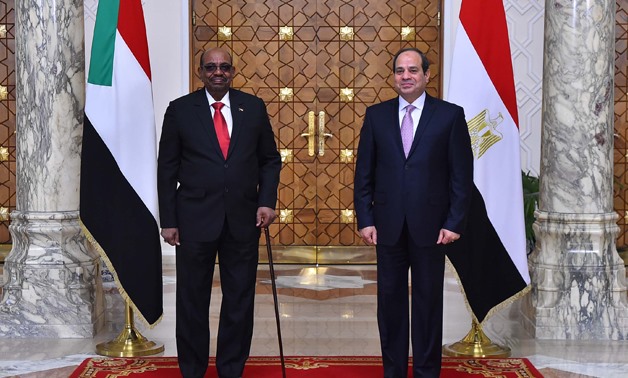
President Sisi meets with Sudanese counterpart Omar al-Bashir in Cairo - press photo
CAIRO – 19 March 2018: In indication to an easing of the recently strained relations between Egypt and Sudan, President Abdel Fatah al-Sisi and his Sudanese counterpart, President Omar al-Bashir, agreed to “activate” bilateral relations and implement the outcomes of the 2015 agreement on the controversial Grand Ethiopian Renaissance Dam (GERD).
Sudan’s Bashir is paying Egypt a one-day visit, where he has tackled disputed issues with President Sisi. This comes after a quartet meeting held between both countries’ foreign ministers and intelligence chiefs last month.

President Sisi meets with Sudanese counterpart Omar al-Bashir in Cairo - press photo
It has been agreed to “continue implementing the outcomes of the Addis Ababa-held Egyptian-Sudanese-Ethiopian tripartite summit on the Renaissance dam to carry out the Declaration of the Renaissance Dam Principles Charter that was signed on March 23, 2015 in Khartoum,” said President Sisi in a joint press conference with Bashir on Monday in Cairo.
Egypt has voiced its concern over Ethiopia’s dam construction, as it would affect Egypt’s 55 billion cubic meter share of the Nile water. However, Addis Ababa sees the dam is necessary for its development and would not negatively affect the downstream countries (Egypt and Sudan).
The Declaration of the Renaissance Dam Principles Charter tackles the management of the dam with written guarantees, and the dam’s reservoir would not be filled without the approval of Egypt and Sudan.

President Sisi meets with Sudanese counterpart Omar al-Bashir in Cairo - press photo
On the bilateral level, President Sisi emphasized during the conference that his country is keen to “maintain the national security of both countries.”
It has been agreed to “activate…and enhance” the Higher Joint Committee, the Consular Committee, the Military Committee, the Nile Valley Authority for River Navigation and the Joint Borders Committee, Sisi added.
The abovementioned joint committees will annually convene their meetings to “secure and enhance both countries’ interests,” Sisi continued.
Both leaders also tackled certain projects concerning energy, electricity, infrastructure, and cooperation in air, ground and maritime transportations.
Also, it has been agreed that Sisi and Bashir will hold their next annual meeting in Khartoum, said Egyptian presidency spokesperson Bassam Radi in a statement following the press conference.

President Sisi meets with Sudanese counterpart Omar al-Bashir in Cairo - press photo
Radi added that both presidents discussed the latest positive developments after easing the strained relations following the quartet meeting.
Egypt’s relations with Sudan were recently strained over the disputed border area of Halaib and Shalateen. On December 23, 2017, Sudan filed a complaint to the United Nations Secretariat to protest a maritime border demarcation deal between Egypt and Saudi Arabia, as the deal denotes the territory as Egyptian on maps.
Halaib and Shalateen, or the Halaib Triangle, is an area of land measuring 20,580 square kilometers located at the Egyptian-Sudanese border on the Red Sea coast. It is part of the Red Sea governorate and consists of three major towns: Halaib (which became a city in February 2014), Abu Ramad and Shalateen.
The area belongs to Egypt politically and administratively, but has been one of the major sticking points in Egyptian-Sudanese relations since the demarcation of borders between the two countries was carried out during the British occupation of Egypt in 1899, at a time when Sudan was part of the Egyptian Kingdom.
The dispute had re-emerged after it had been reported that Turkey would establish a military base on Sudan’s Suakin Island. On January 4, 2018, Sudanese Ambassador to Cairo Abdel Mahmoud Abdel Halim has been withdrawn “for consultation” for two months, before he returning in early March.
On January 12, Ibrahim Mahmoud, assistant to the Sudanese president, said that his country “faces (potential) military threats” from Egypt and Eritrea after claiming that there had been “military movements from Cairo and Asmara along the Sudanese eastern borders,” BBC reported. However, Eritrea has totally denied any Egyptian military movements, saying such remarks are “groundless.”
In a phone call to the Sabahak Masry talk show on MBC channel on Monday, Egyptian Ambassador to Eritrea Yasser Hashem stated that Egypt has no military bases in Eritrea or any other country.
“It is a pure Sudanese property for Sudanese people only,” he said during a joint press conference with Egypt's foreign minister on January 14.
Sudanese Foreign Minister Ibrahim Ghandour affirmed that the island was the subject of talks between Bashir and Turkish President Recep Tayyip Erdogan during the latter’s visit to Khartoum on December 24, where he proposed the restoration of the island's old houses in order to benefit from tourism.
Suakin is a port city in northeast Sudan on the Red Sea. The port was conquered by Turkish (Ottoman) Sultan Selim I in 1517.

President Sisi meets with Sudanese counterpart Omar al-Bashir in Cairo - press photo
Additional reporting by Dunya Hassanein




Comments
Leave a Comment